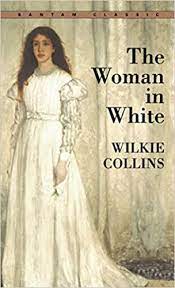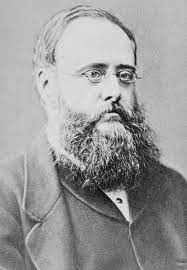The Woman in White Page #9
The Woman in White is Wilkie Collins's fifth published novel, written in 1859. It is a mystery novel and falls under the genre of "sensation novels". The story is an early example of detective fiction with protagonist Walter Hartright employing many of the sleuthing techniques of later private detectives
window--and I said to myself, The lady is dark. She moved forward a few steps--and I said to myself, The lady is young. She approached nearer--and I said to myself (with a sense of surprise which words fail me to express), The lady is ugly! Never was the old conventional maxim, that Nature cannot err, more flatly contradicted--never was the fair promise of a lovely figure more strangely and startlingly belied by the face and head that crowned it. The lady's complexion was almost swarthy, and the dark down on her upper lip was almost a moustache. She had a large, firm, masculine mouth and jaw; prominent, piercing, resolute brown eyes; and thick, coal-black hair, growing unusually low down on her forehead. Her expression--bright, frank, and intelligent--appeared, while she was silent, to be altogether wanting in those feminine attractions of gentleness and pliability, without which the beauty of the handsomest woman alive is beauty incomplete. To see such a face as this set on shoulders that a sculptor would have longed to model--to be charmed by the modest graces of action through which the symmetrical limbs betrayed their beauty when they moved, and then to be almost repelled by the masculine form and masculine look of the features in which the perfectly shaped figure ended--was to feel a sensation oddly akin to the helpless discomfort familiar to us all in sleep, when we recognise yet cannot reconcile the anomalies and contradictions of a dream. "Mr. Hartright?" said the lady interrogatively, her dark face lighting up with a smile, and softening and growing womanly the moment she began to speak. "We resigned all hope of you last night, and went to bed as usual. Accept my apologies for our apparent want of attention; and allow me to introduce myself as one of your pupils. Shall we shake hands? I suppose we must come to it sooner or later--and why not sooner?" These odd words of welcome were spoken in a clear, ringing, pleasant voice. The offered hand--rather large, but beautifully formed--was given to me with the easy, unaffected self-reliance of a highly-bred woman. We sat down together at the breakfast-table in as cordial and customary a manner as if we had known each other for years, and had met at Limmeridge House to talk over old times by previous appointment. "I hope you come here good-humouredly determined to make the best of your position," continued the lady. "You will have to begin this morning by putting up with no other company at breakfast than mine. My sister is in her own room, nursing that essentially feminine malady, a slight headache; and her old governess, Mrs. Vesey, is charitably attending on her with restorative tea. My uncle, Mr. Fairlie, never joins us at any of our meals: he is an invalid, and keeps bachelor state in his own apartments. There is nobody else in the house but me. Two young ladies have been staying here, but they went away yesterday, in despair; and no wonder. All through their visit (in consequence of Mr. Fairlie's invalid condition) we produced no such convenience in the house as a flirtable, danceable, small-talkable creature of the male sex; and the consequence was, we did nothing but quarrel, especially at dinner-time. How can you expect four women to dine together alone every day, and not quarrel? We are such fools, we can't entertain each other at table. You see I don't think much of my own sex, Mr. Hartright--which will you have, tea or coffee?--no woman does think much of her own sex, although few of them confess it as freely as I do. Dear me, you look puzzled. Why? Are you wondering what you will have for breakfast? or are you surprised at my careless way of talking? In the first case, I advise you, as a friend, to have nothing to do with that cold ham at your elbow, and to wait till the omelette comes in. In the second case, I will give you some tea to compose your spirits, and do all a woman can (which is very little, by-the-bye) to hold my tongue." She handed me my cup of tea, laughing gaily. Her light flow of talk, and her lively familiarity of manner with a total stranger, were accompanied by an unaffected naturalness and an easy inborn confidence in herself and her position, which would have secured her the respect of the most audacious man breathing. While it was impossible to be formal and reserved in her company, it was more than impossible to take the faintest vestige of a liberty with her, even in thought. I felt this instinctively, even while I caught the infection of her own bright gaiety of spirits--even while I did my best to answer her in her own frank, lively way. "Yes, yes," she said, when I had suggested the only explanation I could offer, to account for my perplexed looks, "I understand. You are such a perfect stranger in the house, that you are puzzled by my familiar references to the worthy inhabitants. Natural enough: I ought to have thought of it before. At any rate, I can set it right now. Suppose I begin with myself, so as to get done with that part of the subject as soon as possible? My name is Marian Halcombe; and I am as inaccurate as women usually are, in calling Mr. Fairlie my uncle, and Miss Fairlie my sister. My mother was twice married: the first time to Mr. Halcombe, my father; the second time to Mr. Fairlie, my half-sister's father. Except that we are both orphans, we are in every respect as unlike each other as possible. My father was a poor man, and Miss Fairlie's father was a rich man. I have got nothing, and she has a fortune. I am dark and ugly, and she is fair and pretty. Everybody thinks me crabbed and odd (with perfect justice); and everybody thinks her sweet-tempered and charming (with more justice still). In short, she is an angel; and I am---- Try some of that marmalade, Mr. Hartright, and finish the sentence, in the name of female propriety, for yourself. What am I to tell you about Mr. Fairlie? Upon my honour, I hardly know. He is sure to send for you after breakfast, and you can study him for yourself. In the meantime, I may inform you, first, that he is the late Mr. Fairlie's younger brother; secondly, that he is a single man; and thirdly, that he is Miss Fairlie's guardian. I won't live without her, and she can't live without me; and that is how I come to be at Limmeridge House. My sister and I are honestly fond of each other; which, you will say, is perfectly unaccountable, under the circumstances, and I quite agree with you--but so it is. You must please both of us, Mr. Hartright, or please neither of us: and, what is still more trying, you will be thrown entirely upon our society. Mrs. Vesey is an excellent person, who possesses all the cardinal virtues, and counts for nothing; and Mr. Fairlie is too great an invalid to be a companion for anybody. I don't know what is the matter with him, and the doctors don't know what is the matter with him, and he doesn't know
Translation
Translate and read this book in other languages:
Select another language:
- - Select -
- 简体中文 (Chinese - Simplified)
- 繁體中文 (Chinese - Traditional)
- Español (Spanish)
- Esperanto (Esperanto)
- 日本語 (Japanese)
- Português (Portuguese)
- Deutsch (German)
- العربية (Arabic)
- Français (French)
- Русский (Russian)
- ಕನ್ನಡ (Kannada)
- 한국어 (Korean)
- עברית (Hebrew)
- Gaeilge (Irish)
- Українська (Ukrainian)
- اردو (Urdu)
- Magyar (Hungarian)
- मानक हिन्दी (Hindi)
- Indonesia (Indonesian)
- Italiano (Italian)
- தமிழ் (Tamil)
- Türkçe (Turkish)
- తెలుగు (Telugu)
- ภาษาไทย (Thai)
- Tiếng Việt (Vietnamese)
- Čeština (Czech)
- Polski (Polish)
- Bahasa Indonesia (Indonesian)
- Românește (Romanian)
- Nederlands (Dutch)
- Ελληνικά (Greek)
- Latinum (Latin)
- Svenska (Swedish)
- Dansk (Danish)
- Suomi (Finnish)
- فارسی (Persian)
- ייִדיש (Yiddish)
- հայերեն (Armenian)
- Norsk (Norwegian)
- English (English)
Citation
Use the citation below to add this book to your bibliography:
Style:MLAChicagoAPA
"The Woman in White Books." Literature.com. STANDS4 LLC, 2025. Web. 22 Jan. 2025. <https://www.literature.com/book/the_woman_in_white_1567>.




Discuss this The Woman in White book with the community:
Report Comment
We're doing our best to make sure our content is useful, accurate and safe.
If by any chance you spot an inappropriate comment while navigating through our website please use this form to let us know, and we'll take care of it shortly.
Attachment
You need to be logged in to favorite.
Log In